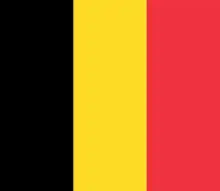| |||||
| Decades: |
| ||||
|---|---|---|---|---|---|
| See also: | Other events of 1944 List of years in Belgium | ||||
Events in the year 1944 in Belgium.
Incumbents
- Monarch: Leopold III[1]
- Regent: Prince Charles, Count of Flanders (from 21 September)
- Prime Minister: Hubert Pierlot
Events
- January
- 14 January – Occupying German authorities order evacuation of civilians from the Belgian coast.[2]: 857
- 16 January – Groupe G resistance organisation dynamites pylons to sabotage electricity supply.[2]: 857
- February
- 5 February – Occupying authorities streamline procedure for death sentences on charges of "terrorism".[2]: 857
- April
- 11 April – Heavy allied bombing of industrial targets and transport infrastructure in Belgian cities.[2]: 858
- 19 April – Mechelen and Leuven bombed.[2]: 858
- May
- 21 May – Cardinal Van Roey appeals to Allies to cease bombing civilian targets in Belgium.[2]: 857
- June
- 7 June – Leopold III, under house arrest since 1940, deported to Germany together with his wife and children.[2]: 858
- July
- 18 July – Military occupation under General Alexander von Falkenhausen replaced by Reichskommissariat of Belgium and Northern France under Reichskommissar Josef Grohé.[2]: 858
- 22 July – Delegates of the Belgian government in exile are among the founding signatories of the Bretton Woods system establishing the International Monetary Fund and the International Bank for Reconstruction and Development
- 27 July – Collaborationist leaders Jef van de Wiele and Hendrik Elias meet with Heinrich Himmler.[2]: 857
- August
- 18 August – Courcelles Massacre in retaliation for the assassination of the collaborationist mayor of Charleroi by the Belgian Resistance.[2]: 859
- 31 August – Many Belgian collaborators flee to Germany.[2]: 857
- September
- 2 September – Allied ground forces enter Belgium.
- 4 September – Liberation of Brussels and Antwerp; Independent Belgian Brigade (Brigade Piron) enters Brussels.[2]: 858-9
- 5 September – Customs Convention between Belgium, the Netherlands and Luxembourg signed.[3]
- 7 September – Liberation of Liège.[2]: 857
- 8 September – Battle of Geel begins (to 23 September)
- 15 September – Cinemas reopened in liberated parts of Belgium.[2]: 857
- 21 September – Prince Charles, Count of Flanders appointed Prince Regent in the king's absence.[2]: 860
- 27 September – Government in exile becomes government of national unity.[2]: 857
- October
- 2 October – Battle of the Scheldt begins (to 8 November)
- 12 October – First V-1 flying bomb attack on Belgium.[2]: 857
- November
- 1 November – Operation Infatuate launched
- 3 November – Last German forces in Belgium surrender at Knokke.[2]: 860
- 8 November – Belgian Parliament lifts parliamentary privilege of members of collaborationist organisations.[2]: 857
- 18 November – Resistance groups disarmed.[2]: 857
- 25 November – Resistance groups demonstrate in Parliament to demand official recognition.[2]: 860
- 28 November – Allied shipping starts to use the Port of Antwerp.[2]: 857
- December
- 16 December – German counter-offensive into Belgium: Battle of the Bulge begins with Battle of Lanzerath Ridge, Battle of Losheim Gap, Battle of St. Vith and Battle of Elsenborn Ridge
- 17 December – Malmedy massacre
- 20 December – Siege of Bastogne begins (to 27 December)
Births
- 22 March – Alfons Thijs, historian (died 2014)
- 31 March – Jean-Marie André, scientist (died 2023)
- 5 April – Willy Planckaert, road bicycle racer
- 1 June – Freddy Herbrand, Olympic athlete
- 8 October – Maurice Bodson, politician (died 2020)
- 21 December – Jacques Beurlet, footballer (died 2020)
Deaths
- 14 January – Walthère Dewé, resistance leader, shot in the street
- 28 January – Aloïs Biebuyck, officer in the First World War
- 23 February – Leo Baekeland, chemical engineer
- 3 March – Paul-Émile Janson, liberal politician (Buchenwald concentration camp)
- 21 March – Pierre de Caters, aviator
- 12 April – Emmanuel de Blommaert, Olympic rider
- 10 May – Adolphe De Meulemeester, colonial official
- 27 May – Adrienne Barbanson, musical patron
- 12 August – Suzanne Spaak, resister
- 17 August – Oswald Englebin, collaborationist mayor of Charleroi, assassinated
- 20 August – Hippolyte De Kempeneer, film producer
- 7 October – Abraham Leon, Trotskyist theorist (Auschwitz concentration camp)
- 1 December – Balthazar De Beukelaer, Olympic fencer
- 11 December – Joseph Maréchal, Thomist philosopher
References
- ↑ "Leopold III | king of Belgium". Encyclopedia Britannica. Retrieved 28 March 2019.
- 1 2 3 4 5 6 7 8 9 10 11 12 13 14 15 16 17 18 19 20 21 22 Alain de Gueldre et al., Kroniek van België (Antwerp and Zaventem, 1987).
- ↑ H.F. van Panhuys, L.J. Brinkhorst, and H.H. Maas (eds.), International Organisation and Integration (Deventer and Leyden, 1968), p. 978.
Wikimedia Commons has media related to 1944 in Belgium.
This article is issued from Wikipedia. The text is licensed under Creative Commons - Attribution - Sharealike. Additional terms may apply for the media files.
